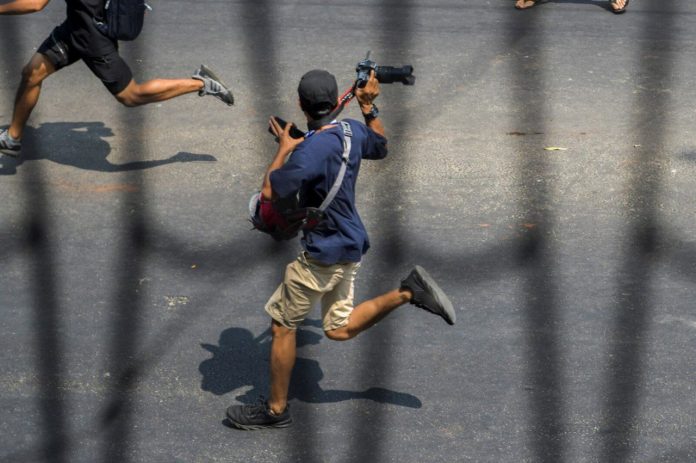The Independent Press Council Myanmar (IPCM) stated on May 3 – World Press Freedom Day – that a total of 40 media workers, including seven women, are being held in prison nationwide. Another seven journalists have been killed since the 2021 military coup.
“Media workers are deliberately targeted, arrested, and sentenced harshly. This is unacceptable. Journalists must not be treated as criminals,” Toe Zaw Latt, the IPCM Secretary, told DVB.
Established in December 2023 by Myanmar journalists and media experts, the Thailand-based IPCM marked World Press Freedom Day by highlighting that at least 200 journalists have been arrested since 2021.
“[They] torture, and impose excessive prison sentences. Some have even been killed. These are the most severe violations of press freedom,” said Hein San, the editor of Myaelatt Athan, a news agency covering central Myanmar.
Than Htike Myint, a reporter for Myaelatt Athan, was sentenced to five years after being convicted of violating the Counter Terrorism Law in April 2024. He was arrested in Myanaung Township of Ayeyarwady Region on Feb. 6.
This was Than Htike Myint’s second arrest and conviction since 2021. Following the coup, he was arrested and charged with Section 505(a) of the Penal Code for “incitement against the military” while working as a freelance reporter for DVB. He was released in a 2022 regime amnesty.
He endured beatings and torture during interrogation at the Light Infantry Battalion (LIB) 51 in Ayeyarwady Region, according to friends and colleagues of Than Htike Myint.
IPCM added that at least 11 journalists have received prison sentences of 10 years or more. Myanmar Now photojournalist Sai Zaw Thaike was sentenced to 20 years for sedition in September 2023.
He was arrested in May 2023, while covering the aftermath of Cyclone Mocha in Sittwe, the Arakan State capital. He has reportedly faced physical abuse and torture inside Yangon’s Insein Prison.
“Soon after the coup, he was the first among our team members to have the opportunity to leave Myanmar for Australia. However, he decided to stay in Myanmar to continue his journalism work on the ground and to take care of his mother in Yangon. We will continue to demand his immediate release,” Swe Win, the Myanmar Now editor-in-chief, told DVB.
The publication licenses of 15 media outlets, including DVB, were revoked by the military in 2021. Due to severe restrictions placed on independent media in Myanmar by the regime in Naypyidaw, 64 newsrooms have had to cover the country from exile over the last four years, according to IPCM.
One of the largest donor countries, the U.S. has effectively silenced Burmese language broadcast news agencies Voice of America (VOA) and Radio Free Asia (RFA). In March, U.S. President Donald Trump signed an executive order to dismantle the U.S. Agency for Global Media (USAGM), which oversees VOA and RFA, placing them at risk of permanent closure.
The IPCM has documented that about 44 percent of funding to Myanmar media typically comes from international organizations and foreign governments, including the U.S.
BBC Burmese reported that funding cuts from the U.S. has negatively impacted the operations of DVB, The Irrawaddy, Mizzima, and Narinjara News, which covers Arakan State with a limited number of staff.
Myanmar ranks alongside China and Israel as the world’s three worst jailers of journalists, according to the Committee to Protect Journalists (CPJ). Reporters Without Borders (RSF) World Press Freedom Index ranks Myanmar 169 out of 180 countries globally, placing it near the bottom of the list with the least amount of media freedom.



